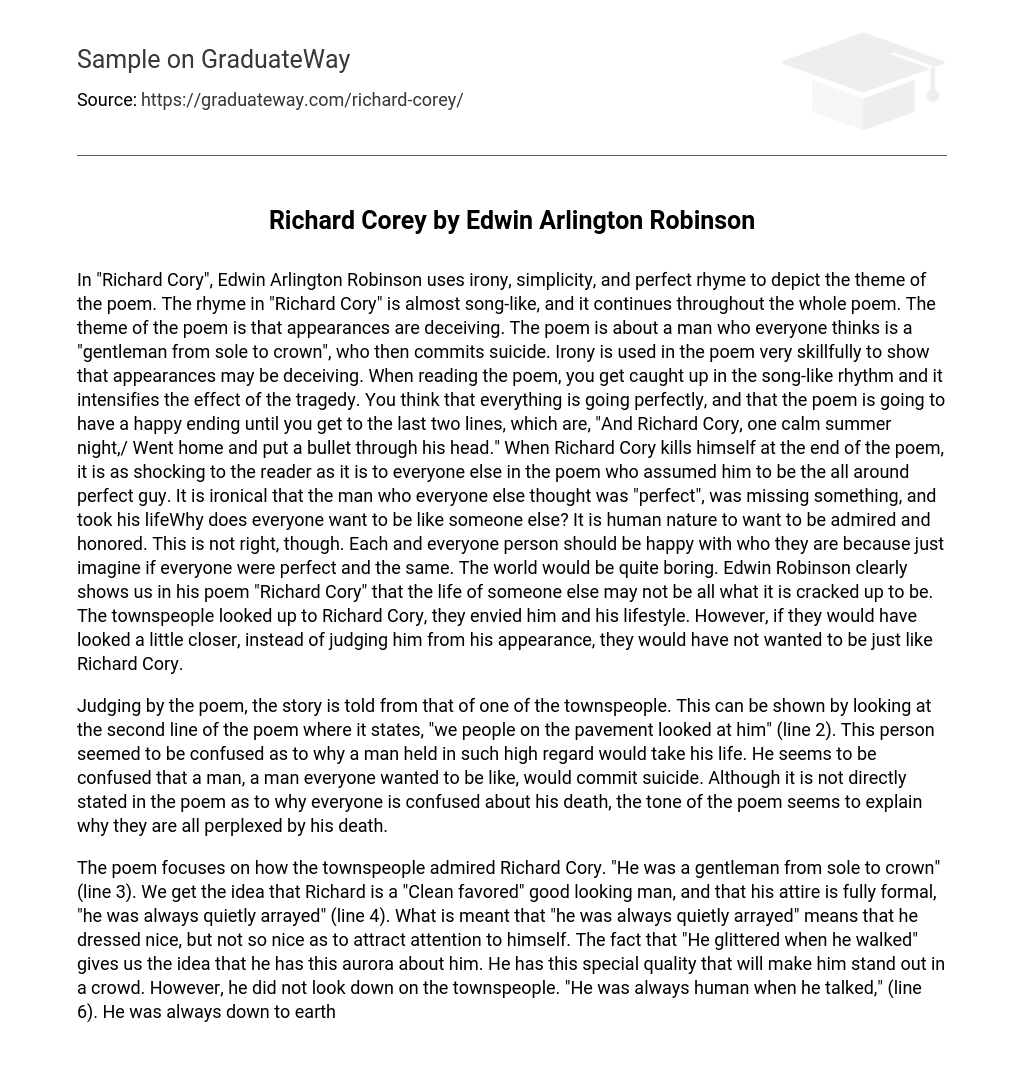Edwin Arlington Robinson’s poem “Richard Cory” utilizes irony, simplicity, and perfect rhyme to communicate its theme. The consistent rhyme scheme gives the poem a harmonious flow, enhancing its impact. The central message of the poem is that appearances can be deceptive. It narrates the story of Richard Cory, a man admired and respected by all, who tragically ends his own life. The clever use of irony emphasizes that things are not always as they appear. The rhythmic quality of the poem captivates readers, intensifying the feeling of tragedy. Initially, the poem creates a positive impression before delivering a shocking twist in its final lines: “And Richard Cory, one calm summer night,/ Went home and put a bullet through his head.” This unexpected revelation parallels the disbelief felt by those who believed he was flawless. It reveals the irony that someone considered perfect by others had something significant lacking within them to drive them to such extreme action. This raises questions about why people strive to emulate others. It is natural for humans to seek admiration and recognition; however, this desire is misguided as individuals should find contentment in their own unique identities. Imagining a world where everyone is perfect and identical would lead to an uninspiring and monotonous existence.
In “Richard Cory,” Edwin Robinson skillfully portrays the idea that desiring to live someone else’s life may not be as perfect as it seems. Despite their admiration for Richard Cory and their longing for his way of living, the townspeople would have altered their viewpoint had they taken a closer look at him instead of solely judging him based on his appearance.
According to the poem, it appears that a townspeople is narrating the story. This can be deduced from the second line of the poem which mentions, “we people on the pavement looked at him” (line 2). This individual seems bewildered by the fact that someone held in high regard would choose to end their own life. They express confusion over why such a revered individual would resort to suicide. While the poem does not explicitly reveal the reasons behind everyone’s confusion about his death, its tone seems to offer an explanation for their perplexity.
The townspeople greatly admire Richard Cory, seeing him as a well-dressed gentleman with a pleasing appearance. They are captivated by his charm and allure. Despite his wealth and status, he remains humble in his interactions with them. The townspeople believe that Richard has everything necessary for happiness in life, even surpassing a king in riches. They envy his possessions to the point of sacrificing their own well-being, going without meat and cursing bread.
The ironic twist of this poem is revealed in its last two lines. Throughout, it portrays Richard as admired and possessing various qualities. However, we learn suddenly that Richard chose to end his own life by “putting a bullet through his head” (line 16). This raises questions about why someone so popular and desired would take such a drastic step. Instead of choosing a time when he was feeling low, he did it “one calm summer night” (line 15). This leads us to the crucial question: “Is Richard the epitome of the person we aspire to be?” From the townspeople’s perspective, it appears so. But Richard himself believed differently. Ultimately, he chose death over life. Perhaps it is wiser to find contentment in accepting ourselves as we are.





